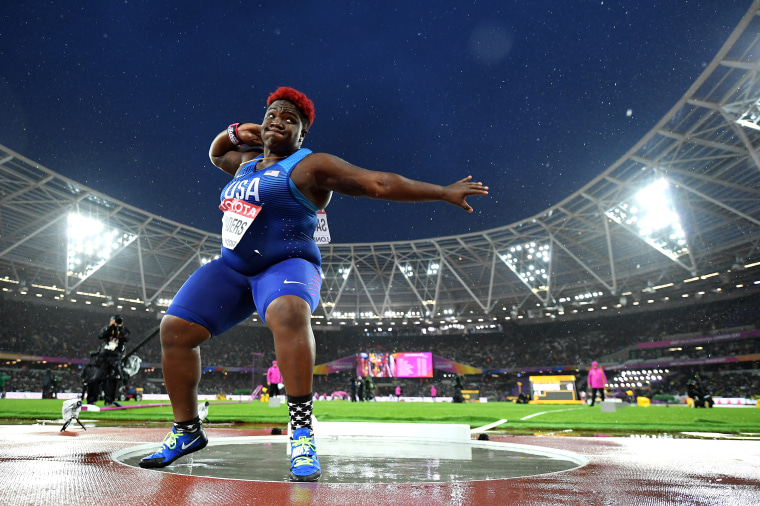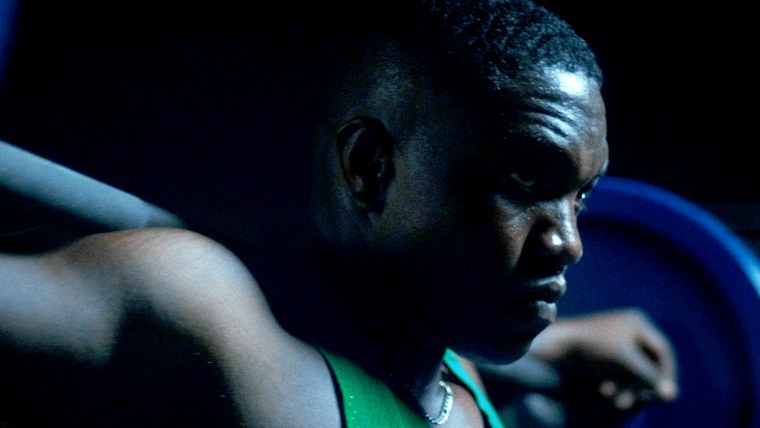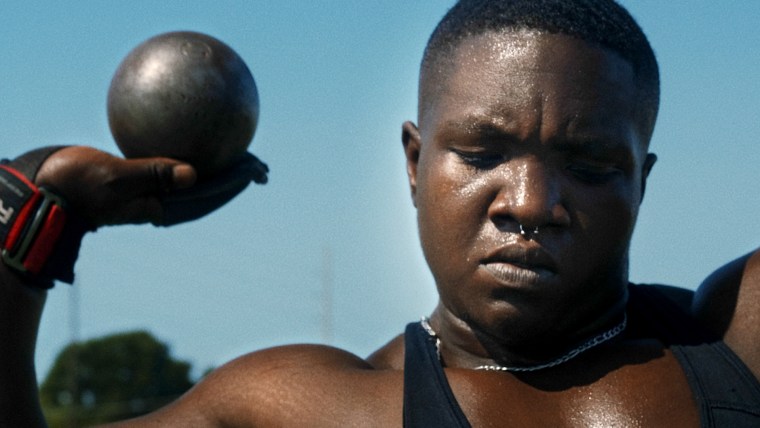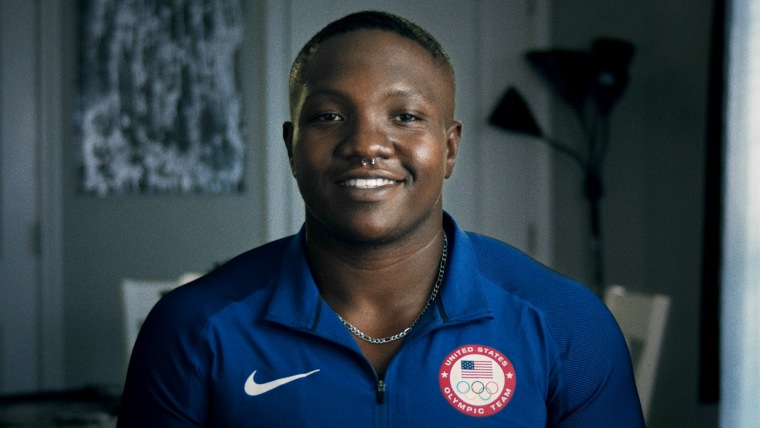In January 2020, Olympic shot putter Raven Saunders read a news article about Bryce Gowdy, a Black teenager from Deerfield Beach, Florida, who died by suicide.
He and his family had been living in a car as they endured financial difficulties, and the circumstances weighed on him, according to The Washington Post. Gowdy, 17, had been awarded a full scholarship to play football for Georgia Tech, where he was due to start classes a week after his death.
After reading Gowdy’s story, Saunders — a queer Black woman — felt compelled to share her own mental health journey.
She shared a photo on Twitter of a hospital bracelet she had been given two years earlier, after a breakdown that nearly ended in suicide.
Less than two years before her hospitalization, Saunders had placed fifth at the 2016 Olympic Games in Rio; at 19 years old, she was the youngest woman competing at the games in the shot put. But when she returned home, she was faced with a flood of feelings — some of which stemmed from childhood traumas — that eventually manifested themselves as depression.
“It felt like I was reaching out to people and nobody was answering,” said Saunders, now 25. “I really was just going through the motions.”
Now, during Mental Health Awareness Month, Saunders is speaking out again — this time, in a PBS mini-documentary in which she charts her journey to the Olympics and through her mental health struggles.
She is sharing her story in the hope that by doing so, she can inspire other young athletes dealing with depression to seek help.
“I felt like by opening up and telling the world my story, another college athlete could possibly be like, ‘I would never have thought that somebody that has done what they’ve done could’ve been through the exact same thing that I have,’” Saunders said.
‘'The Hulk' became who I was’

Saunders knew she was strong early on. She bench pressed 205 pounds as a high school freshman, she said, which earned her the nickname "Diesel." As a sophomore, she won a South Carolina state title in the shot put.
“I was always strong, even amongst the guys,” she said.
But growing up in Charleston with stepparents who brought domestic abuse, drug addiction and alcoholism into her mother’s home, Saunders felt weak and avoided opening up to others for comfort.
Being tough “was a protective mechanism,” she said, adding that she was “just constantly making sure that I don’t open up to the wrong person because they may try and use it against me later on.’”
When Saunders set foot in her high school weight room, she saw an opportunity to transform herself into the protector she always wished her mother had.
“I’m like, ‘I’m in a position now. ... I’m going to do everything I can so that next time around, nope, it’s not happening,’” she said.
What followed was surprise success in a sport she grew to love.
“After I won the state title, I was like, ‘I think I could be good at this.’”
She landed at Southern Illinois University in 2014, then transferred to the University of Mississippi the following year and earned a new nickname: the Hulk. And as she got even stronger and training got more intense, the boundaries between Saunders and her athletic persona began to melt away. Feelings and self-care fell by the wayside.
“Track became my identity — the Hulk became who I was,” she said.
‘This moment is so big, I had to give it everything I have’
As Saunders prepared for the Olympic Trials and looked forward to what she hoped would be a spot on Team USA in 2016, she reveled in the chance to check off a major career goal by the time she turned 20.
“That’s really how I treated the year — like I had nothing to lose and everything to gain,” she said.
Saunders earned her ticket to Rio after placing second in the trials. In Rio, she summoned some of her childhood memories of abuse and instability to muster the motivation to perform at her highest level.

“One of the things that pushes me to that level is that I always like to remember some of the hardest things that I’ve went through, because in those moments ... you’re at the Olympic Games, it’s so much when you remember all the things you had to go through and all of the things you had to overcome,” she said.
Her focus paid off: She came in fifth, but “felt almost as if I had won.”
Michelle Carter, 30, became the first American woman to win gold in the event. For Saunders, watching Carter, who is also Black, felt like a glimpse into both her past — given that she had looked up to Carter as a young athlete — and what she hoped her own future on the podium would look like.
“I was sitting out there thinking, ‘This is what it’s going to be like when it’s my turn,’” she said.
‘It was kind of like a hopelessness’
When Saunders returned to the states, she was left without much time or support to process her emotions, she said — including those she had summoned from her childhood to perform at her best. Between school, training and the financial strain, she felt burned out.
“I had no type of mental break to de-stress. ... As the weeks kept going, I was in a daze,” she said. “Everything else outside of training, I honestly just gave up on. … It was kind of like a hopelessness.”
In January 2018, after returning from winter break, her depression got worse, and she began to have suicidal thoughts, she said.
One day, driving past a cliff that she passed on her regular route to practice, she considered driving off of it, she said.
“I looked at it, and I’m like, ‘Hey, I could do this,’” she said in the mini-documentary. “But something in me was just like, ‘Hit up your therapist.’”
Her therapist responded: “Give me a minute to help you.”
Help soon came in the form of nearly two months in mental health facilities, where Saunders had access to more intensive therapy and conversations with her mom about some of her unaddressed childhood wounds, she said.
Therapy “helped so much in the form of self-discovery and really learning about me as a person outside of my sport,” Saunders said.
It also allowed her to get back to the sport she loves. In June of that year, Saunders announced she signed with Nike, and placed third at the USA track and field championships.
‘If I could have my way, gold all the way’
Now, Saunders is gearing up for the Olympic Trials next month in Eugene, Oregon, where she hopes to reclaim her spot on the U.S. Olympic team.

This time around, she plans to make regular therapy sessions a priority along with her shot-put training, she said.
“I acknowledge where my mindset is a lot more now than I did before,” she said. “I don’t let those bad times get the best of me.”
And Saunders recently requested a Black woman therapist so she can start diving into how her identity has shaped her life and her mental health, she said.
Saunders is not the first Olympian to speak out about her mental health: runners Brenda Martinez and Alexi Pappas, gymnast Simone Biles and swimmer Michael Phelps are among those who have discussed their struggles with depression and the role that therapy has played in their lives.
The U.S. Olympic and Paralympic Committee provides Team U.S.A. athletes with year-round access to mental health services, according to spokesperson Jon Mason. The committee has also increased its mental health offerings over the past year, in light of the pandemic, by creating a 13-member mental health task force that meets monthly, hiring three independent mental health officers, and launching an online registry of mental health providers and a round-the-clock support line, Mason added. And in 2019, the committee created its athletes services division to separate professionals supporting athletes’ mental health and wellness from those supporting their athletic performance, he said.
For Saunders, having a mental health plan in place means she can devote more time to focusing on her goals: earning a spot in Tokyo, where she hopes to emerge as the best in the world.
“There are some great women in the world — there’s a slew of us right now,” she said. “Anybody can take home that gold medal. But if I could have my way, gold all the way.”
If you or someone you know is in crisis, call the National Suicide Prevention Lifeline at 800-273-8255, text HOME to 741741 or visit SpeakingOfSuicide.com/resources for additional resources.
